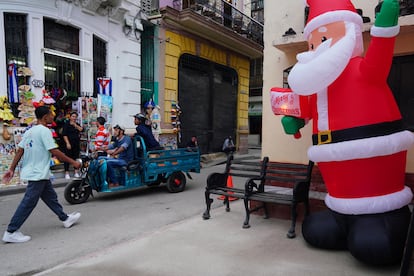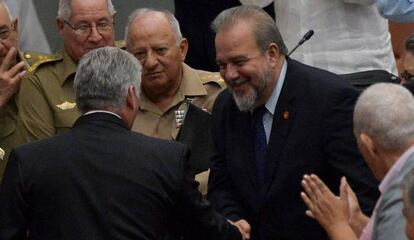Cuba announces package of economic measures that will make life on the island more expensive
Prime Minister Manuel Marrero says fuel, some electricity rates and transportation will increase. He also acknowledged that not enough has been done for the development of the economy

On the verge of ending a year strongly marked by a lack of food and medical supplies as well as inflation, an unprecedented migratory wave and a generalized crisis that has affected the daily lives of Cubans, the government has announced a package of economic measures for 2024 that will make life more expensive for families on the island in the short term.
Speaking before the National Assembly, Prime Minister Manuel Marrero Cruz said the government was unhappy about “not having made the necessary progress” this year. After blaming Cuba’s situation on the decades-long US embargo, as is customary, as well as on delays caused by the pandemic and the global crisis, Marrero acknowledged that Cuba has failed to achieve a sustainable increase of national production, and that the government could have done better: “We could have done more things. Insufficiencies of our own and subjective problems persist that affect the capacity of economic programs and projections.”
“We need a reinforced Ministry of Economy and Planning,” he said, adding that it is also necessary to buttress the work of the Ministry of Finance and Prices. The prime minister alluded to the “difficulties,” in reference to the high prices of products on the island due to inflation and shortages, and talked about “rectifying policies that have not allowed us to advance.” He also recognized that the country is not working to increase the diversification of goods and services, and that the participation of foreign investment in the development of the economy is insufficient.
The prime minister then announced a series of measures such as hikes in fuel prices, electricity rates for certain homes and public transportation fares. “These will not have a great immediate effect nor will they solve all the problems, but we will move forward with the conviction that it is the correct path to improve the current situation,” said Marrero.

Cubans had feared the rise in fuel prices since a few days ago, when President Miguel Díaz-Canel spoke of a possible increase in the cost of gasoline. “In what country in the world can you buy nine liters of gasoline for one dollar?” said Marrero, without mentioning the low wages in a country with an increasingly weakened currency and where the minimum wage of 2,100 Cuban pesos is equivalent to about $8. Likewise, the official clarified that the government will increase electricity rates by 25% for Cuban households considered high consumers that exceed the consumption of 500 kWh.
As a result of the rise in fuel prices, Marrero acknowledged that transportation rates will increase. In addition, prices will be raised for the non-metered water rate, affecting users who do not have a meter installed, because, according to the official, the current rate (seven Cuban pesos, less than a cent) does not stimulate water savings. Next year, likewise, the price of cigarettes and tobacco, the price of liquefied gas cylinders, as well as those of green medicine (medicinal plants) in the country will increase.
Regarding remittances, one of the main pillars of the economy thanks to the Cuban exiles, he indicated that it was a priority for the country to recover these flows, as well as increase the income of foreign currency, recover tourism and boost production of nickel, tobacco and rum. Marrero explained that, in order to encourage national production, tariffs on imports of raw materials and intermediate goods will be reduced by 50%; and on the other hand, tariffs will be raised on the import of some Cuban products such as cigarettes, rum and beer. He also stressed that electronic commerce will be encouraged.
There will be a new extension to the tariff exemption for the import of food, hygiene products and medicines, which was to expire on December 31 and which authorizes Cubans to import non-commercial items, without limits on their value and duty-free. However, Marrero added that the government will work to increase the in-store offer in MLC (Freely Convertible Currency) so that Cubans can access the network of national stores. In the former, one can only purchase goods with credit cards backed by dollars or other foreign currencies.
To workers in the health and education sectors, Marrero announced that wages for night shifts will be increased, based on years of service and amount of work. The prime minister also mentioned the immigration crisis that has pushed 400,000 Cubans to leave the island in the last two years. According to him, the new measures are aimed at “restoring the macroeconomic requirements that make it possible to guarantee a favorable environment for economic growth, development and the process of socialist construction.”
Sign up for our weekly newsletter to get more English-language news coverage from EL PAÍS USA Edition
Tu suscripción se está usando en otro dispositivo
¿Quieres añadir otro usuario a tu suscripción?
Si continúas leyendo en este dispositivo, no se podrá leer en el otro.
FlechaTu suscripción se está usando en otro dispositivo y solo puedes acceder a EL PAÍS desde un dispositivo a la vez.
Si quieres compartir tu cuenta, cambia tu suscripción a la modalidad Premium, así podrás añadir otro usuario. Cada uno accederá con su propia cuenta de email, lo que os permitirá personalizar vuestra experiencia en EL PAÍS.
¿Tienes una suscripción de empresa? Accede aquí para contratar más cuentas.
En el caso de no saber quién está usando tu cuenta, te recomendamos cambiar tu contraseña aquí.
Si decides continuar compartiendo tu cuenta, este mensaje se mostrará en tu dispositivo y en el de la otra persona que está usando tu cuenta de forma indefinida, afectando a tu experiencia de lectura. Puedes consultar aquí los términos y condiciones de la suscripción digital.









































